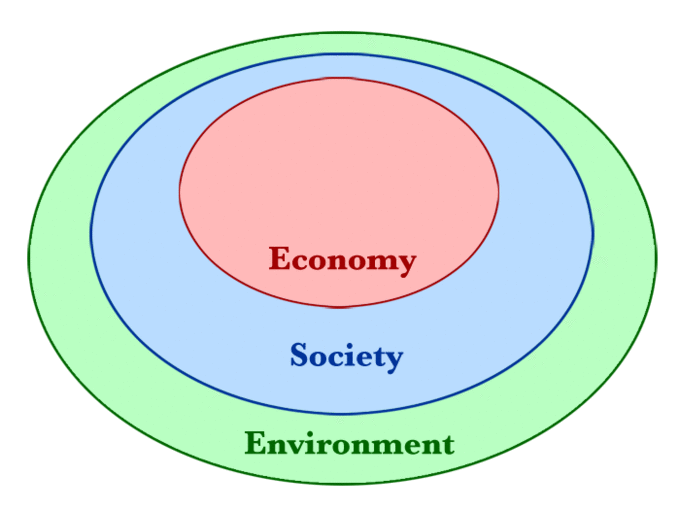Natural Resource Economics
Natural resource economics focuses on the supply, demand, and allocation of the Earth's natural resources. The main objective of natural resource economics is to gain a better understanding of the role of natural resources in the economy. By studying natural resources, economists learn how to develop more sustainable methods of managing resources to ensure that they are maintained for future generations. Economists study how economic and natural systems interact in order to develop an efficient economy.
As a field of academic research, natural resource economics addresses the connections and interdependence between human economies and natural ecosystems. The focus is how to operate an economy within the ecological constraints of the earth's natural resources .

Natural Resource Economics
This diagram illustrates that society and the economy are subsets of the environment. It is not possible for social and economic systems to exist independently from the environment. Natural resource economics focuses on the demand, supply, and allocation of natural resources to increase sustainability.
Areas of Study
Economists study the commercial and recreational use and exploitation of resources. Traditionally, natural resource economics focused on fishery, forestry, and mineral models. However, in recent years many more topics have become increasingly important, including air, water, and the global climate. Natural resource economics is studied on an academic level, and the findings are used to shape and direct policy-making for environmental issues.
Examples of areas of study in natural resource economics include:
- welfare theory
- pollution control
- resource exhaustibility
- environmental management
- resource extraction
- non-market valuation
- environmental policy
Additionally, research topics of natural resource economists can include topics such as the environmental impacts of agriculture, transportation and urbanization, land use in poor and industrialized countries, international trade and the environment, and climate change.
Impact of Natural Resource Economics
The findings of natural resource economists are used by governments and organizations to better understand how to efficiently use and sustain natural resources. The findings are used to gain insight into the following environmental areas:
- Extraction: the process of withdrawing resources from nature. Extractive industries are a basis for the primary sector of the economy. The extraction of natural resources substantially increases a country's wealth. Economists study extraction rates to make sure that resources are not depleted. Also, if resources are extracted too quickly, the sudden inflow of money can cause inflation. Economists seek to maintain a sense of balance within extraction industries.
- Depletion: the using up of natural resources, which is considered to be a global sustainable development issue. Many governments and organizations have become increasingly involved in preserving natural resources. Economists provide data to determine how to balance the needs of societies now and preserve resources for the future.
- Protection: the preservation of natural resources for the future. The findings of economists help governments and organization develop measures of protection to sustain natural resources. Protection policies state the necessary actions internationally, nationally, and individually that must take place to control natural resource depletion that is a result of human activity.
- Management: the use of natural resources taking into account economic, environmental, and social concerns. This process deals with managing natural resources such as land, water, soil, plants, and animals. Particular focus is placed on how the preservation of natural resources impacts the quality of life now and for future generations.